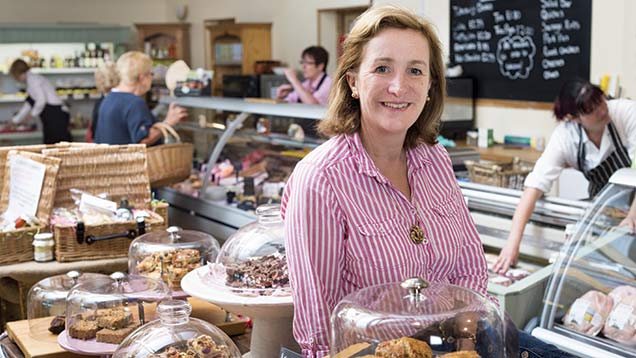Opinion: Work to a ripe old age – but plan ahead
 Sally Jackson ©Jim Varney
Sally Jackson ©Jim Varney “Old farmers never die, they just go to seed,” pronounced the sticker on the back of the tractor I followed through our local market town.
I had plenty of time to read it as the lad driving the tractor was having a good chat on his mobile and was oblivious to the fact that he had about 25 cars behind him.
The policeman I recently met while on holiday would, no doubt, have been delighted to catch the telephone-toting farmworker.
The officer mentioned that he would be retiring on his 50th birthday in two years’ time.
See also: Sally Jackson on organised crime
This is someone who is fit and capable person (ex-army) and at the top of his game in terms of man management and experience, yet he is leaving on a full pension.
It made me think how different the situation is in farming. The average age of the UK farmer is now 58, according to a recent report – which means that many are “dying with their boots firmly on”.
Is this such a bad thing? Is it better to quit working earlier rather than later in life?
Some people are keen to pack in the day job the moment it is financially possible so they can devote more time leisure. But when I was recently asked what my hobbies were, I had to admit to having none.
It worried me. Should I join the current husband in Lycra shorts and slog round the countryside on an overpriced bicycle?
Or maybe start playing bridge (a fate worse than death)? Or even spoil a walk by hitting a small ball around a golf course?
Then I read that Confucius said: “Choose a job you love and you will never have to work another day in your life.” It was a lightbulb moment. I love what I do.
Running a busy business and coping with the complexities of keeping thousands of visitors happy while juggling staff and money drives me insane at times. But I never dread a Monday morning.
How many people in London traveling in a tin tube to work would agree?
If you look at farming realistically, putting any romantic notions aside (I never thought I’d write “romantic” and “farmer” in the same sentence), certain questions do present themselves.
Why do dairy farmers get up at ridiculous o’clock to milk their herd and then have to fight to get a decent price for their milk?
Why do hill farmers raise sheep on terrain so remote they have to struggle out in deep winter snow to rescue them?
Why do some tenant farmers work their socks off to pay their landlords more than they pay themselves?
Why stand at a freezing cold farmers’ market in February selling beef? Why start a farm shop, with all the hassles it entails?
It can only be that they love the job or are umbilically and emotionally attached to the land.
With the older generation reluctant to let go of the reins, however, the next generation can find it difficult to get a start on the farming ladder.
If only the “old boys” could be persuaded to take a step back, then youngsters could be given a chance to thrive.
This is doubly necessary as events such as Open Farm Sunday do an increasingly good job of modernising the public image of the farmer and attracting would-be new entrants.
This year it persuaded 250,000 people to visit a farm. There would be a lot of aspiring farmers among that lot, too.
The only downside to farmers working so late in life is that they all seem to forget that they will die.
Farming consultants are constantly amazed at the idiocy of some who refuse to discuss any succession plans until it is almost too late or family relationships have already broken down.
When setting up in business, I was told to plan it as if I were going to sell up in five years’ time.
In hindsight, the advice should have been to plan as if I was going to sell it in 15 years’ time, but the principle is the same.
A timescale for business success and then an exit strategy, whether implemented or not, helps to focus the mind.
There are a very few successful farming businesses locally that have adhered to this rule, whereas so many have not.
What tends to also focus the mind in farming is adversity.
Farm diversification is borne of necessity. At the Farm Business Innovations Show and The Farm Shop & Deli Show, the Farma stand was inundated with people wanting to start up a farm shop or restaurant.
It was really heartening that it was often two generations of the farming family who were seeking advice.
Farmshops seem to be passed from one generation to the next with so much more ease than farms themselves.
Maybe this is because it is the “new” business and the systems for inheritance or sale are imbedded in the initial planning process.
The beauty of a farming business is that we can still be involved in the business as we get older and we are not encouraged to retire (nor could afford to) at 50.
Unlike the police, however, we all have to realise that we are not immortal, we should put plans in place and that the next generation do know what they are talking about… Maybe.
Sally and husband Andrew farm 364ha just outside Scunthorpe in north Lincolnshire. They have a farm shop, The Pink Pig Farm (a former winner in the diversification category of the Farmers Weekly Awards), with a 90-seater café and farm trail. Sally is chairman of the Farmers’ Retail and Markets Association (Farma).

